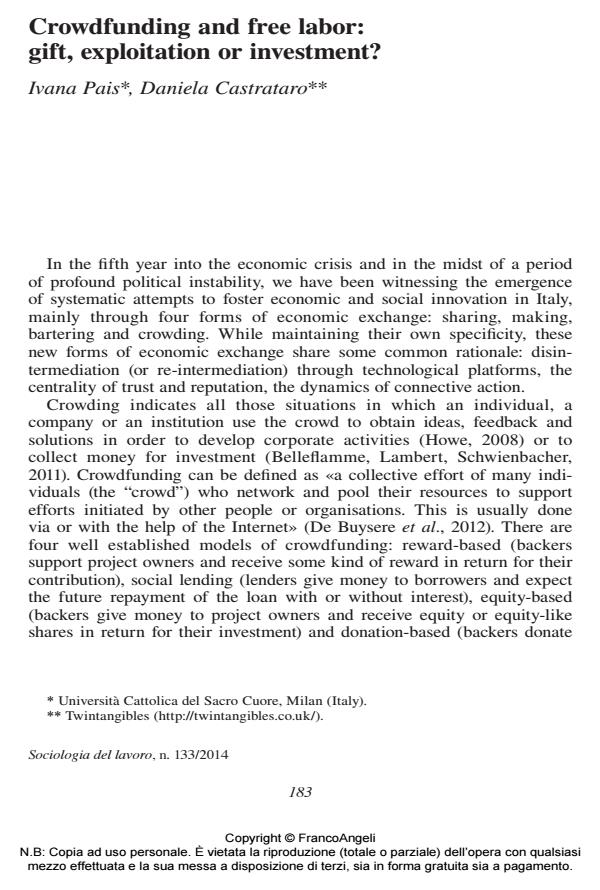Crowdfunding and free labor: gift, exploitation or investment?
Journal title SOCIOLOGIA DEL LAVORO
Author/s Ivana Pais, Daniela Castrataro
Publishing Year 2014 Issue 2014/133
Language English Pages 13 P. 183-195 File size 605 KB
DOI 10.3280/SL2014-133013
DOI is like a bar code for intellectual property: to have more infomation
click here
Below, you can see the article first page
If you want to buy this article in PDF format, you can do it, following the instructions to buy download credits

FrancoAngeli is member of Publishers International Linking Association, Inc (PILA), a not-for-profit association which run the CrossRef service enabling links to and from online scholarly content.
Il saggio si propone di rispondere a una domanda principale: le diverse forme di lavoro gratuito agite nel crowdfunding sono percepite dagli attori coinvolti come dono, sfruttamento o investimento? La domanda di ricerca è stata articolata rispetto ai modelli di crowdfunding, gli attori intervistati e in relazione ai significati che essi attribuiscono alla loro esperienza. La ricerca è stata effettuata mediante l’invio di un questionario on-line a tutte le piattaforme italiane e attraverso interviste semi-strutturate con un campione di piattaforme e di gestori di campagne. Il lavoro è organizzato in tre parti principali: definizione del crowdfunding, analisi delle logiche operative e dei meccanismi sociali che lo governano; mappa della diffusione, crescita e impatto del crowdfunding in Italia; analisi dei significati attribuiti al lavoro gratuito tra i principali attori del settore. Si conclude con l’individuazione di nuovi percorsi di ricerca per l’analisi di un settore che è ancora in fase embrionale, ma presenta alti tassi di crescita.
Keywords: Crowdfunding, free labour, gift, exploitation, investment, social media
- The Role of Islamic Crowdfunding Mechanisms in Business and Business Development Achsania Hendratmi, Puji Sucia Sukmaningrum, Muhamad Nafik Hadi Ryandono, Tri Ratnasari, in GATR Journal of Business and Economics Review /2019 pp.10
DOI: 10.35609/jber.2019.4.1(2)
Ivana Pais, Daniela Castrataro, Crowdfunding and free labor: gift, exploitation or investment? in "SOCIOLOGIA DEL LAVORO " 133/2014, pp 183-195, DOI: 10.3280/SL2014-133013